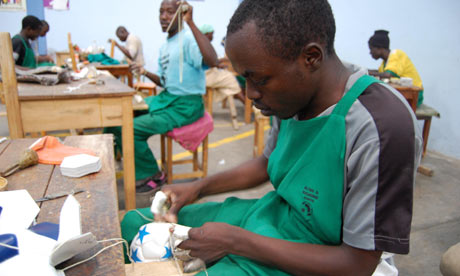This article is an interview with Will Prochaska, the director of Alive & Kicking, an African social enterprise using sports, specifically, the manufacture of soccer (and other sport) balls to provide recreation and promote health knowledge amongst children as well as create jobs for adults in low income areas in Kenya and Zambia. In this interview conducted by Kerry Ann Eustice of the Guardian, Prochaska discusses his enterprise and the challenges he has faced in developing and growing his business, particularly when he is committed to fair pay for his employees and his competitors are not.
He has established a sustainable business by differentiating his product with the help of retail outlets in both Kenya and Zambia. His marketing strategy involves going into retail outlets and highlighting the low quality and poor labor conditions in the manufacturing of his competitors’ products in other countries. He compares this to his own manufacturing process, educating his potential customers about the benefits of a locally produced product.

This is a very interesting example, particularly as it relates to other aspiring social enterprises in their development and growth. As, Prochaska indicates, his business had particular difficulty in establishing themselves as an independent operation, free of outside support, while still providing a valuable social service. To overcome this difficulty, the mentality of the entire organization had to change, some of which was achieved through more ownership and responsibility by staff within each operation. He also provides some advice to other enterprises, recommending that everyone involved in the organization needs to understand the need for the business to operate independently, while making the case for avoiding unrealistic expectations inside and outside the company by overtly pushing the social mission.
What do you think about Alive & Kicking’s marketing model? Would it be effective (and sustainable) in other situations for other businesses? In addition, do you agree with Prochaska that it is necessary to push away from the charity (or social enterprise) label to be sustainable?

No comments:
Post a Comment
Note: Only a member of this blog may post a comment.